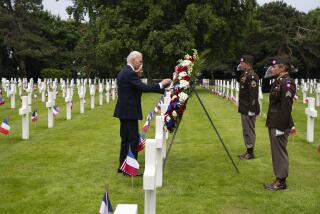Bush Warns Against Return to Isolationism
- Share via
HONOLULU — President Bush on Saturday sounded a fervent warning against the isolationism that he said “flew escort for the bombers” that surprised American forces at Pearl Harbor 50 years ago and could now, with the Cold War won, undermine the peace.
The appeal to the nation to remain engaged abroad marked a defiant challenge to Bush’s critics who charge that his Administration has neglected the home front in its preoccupation with the wider world.
“To believe that turning our backs on the world would improve our lot here at home is to ignore the tragic lessons of the 20th Century,” Bush declared in an address commemorating the 50th anniversary of the Japanese attack on Pearl Harbor.
Bush made no direct mention of critics from both parties who have urged that the government now move to concentrate on domestic issues. But on an emotional day of remembrance, the political subtext was unmistakable as he decried those who would put “America First” to the exclusion of involvement in international affairs.
“We stand here today on the site of a tragedy spawned by isolationism,” the President told hundreds of World War II veterans assembled on a Navy pier. “And it is here we must learn, and this time avoid, the dangers of today’s isolationism and its economic accomplice, protectionism.”
Bush vowed to also press other nations to forsake such a turn inward, telling the leaders of Japan “in particular” that the solemn anniversary should prompt a redoubling of efforts to move toward freer markets.
But Bush’s message seemed largely directed toward the United States, where the collapse of the Soviet Union and its allies have contributed to what some believe is a revival of isolationist sentiment.
The symptoms include a new congressional antipathy toward foreign aid and revived threats from Democratic lawmakers, including House Majority Leader Richard A. Gephardt (D-Mo.), of new trade sanctions against Japan. An expected Republican presidential challenger, conservative columnist Patrick J. Buchanan, has sounded even stronger isolationist themes.
But on the anniversary of the day that thrust the United States into World War II, Bush noted that isolationists were gathering under an “America First” banner in Pittsburgh, Pa., precisely at the moment half a century ago when Japan launched its Pearl Harbor attack.
“The isolationists failed to see that the seeds of Pearl Harbor were sown in 1919, when a victorious America decided that in the absence of a threatening enemy abroad, we should turn all of our energies inward,” Bush said. “That notion of isolationism flew escort for the bombers that attacked our men 50 years ago.”
And even after World War II, Bush said, “some called for America’s return to isolationism as if abandoning world leadership was the prerequisite for dealing with pressing matters back home. They were rudely awakened by the brutal reality of the Iron Curtain, the Soviet blockade of Berlin and the communist invasion of South Korea.
“Now we stand triumphant for the third time this century--this time in the wake of the Cold War,” the President observed. “As in 1919 and 1945, we face no enemy menacing our security.”
In what seemed a deeply felt appeal, Bush insisted that the United States has prospered most and been most secure when it emphasized engagement and leadership in world affairs.
The speech on the Navy pier was one of three addresses Bush delivered on the anniversary of the Japanese attack, and in each he sounded the theme that it was important for the United States to remain engaged and not to succumb to resurgent hostility toward Japan.
“World War II is over. It is history. We won,” Bush said to the applause of veterans on the pier.
But aboard the memorial to the battleship Arizona, some Pearl Harbor veterans said it was hard to listen to Bush’s message of forgiveness. “The shooting war is over, but the economic war is still going on,” said Lewis P. Robinson, an architect from Solana Beach, Calif.
Robinson, who had been a seaman first class on the vessel, told the President he had been “on liberty trying to get back to the ship” when the Japanese attack began.
In addition to his denunciation of protectionist sentiment, Bush also seemed to use his speeches to warn against cuts in defense budgets that might leave the United States vulnerable once again.
“Fifty years ago, we paid a heavy price for complacency and overconfidence,” Bush said as Secretary of Defense Dick Cheney and Gen. Colin L. Powell, chairman of the Joint Chiefs of Staff, nodded solemnly behind him. “That too is a lesson we shall never forget.”
More to Read
Get the L.A. Times Politics newsletter
Deeply reported insights into legislation, politics and policy from Sacramento, Washington and beyond. In your inbox twice per week.
You may occasionally receive promotional content from the Los Angeles Times.










